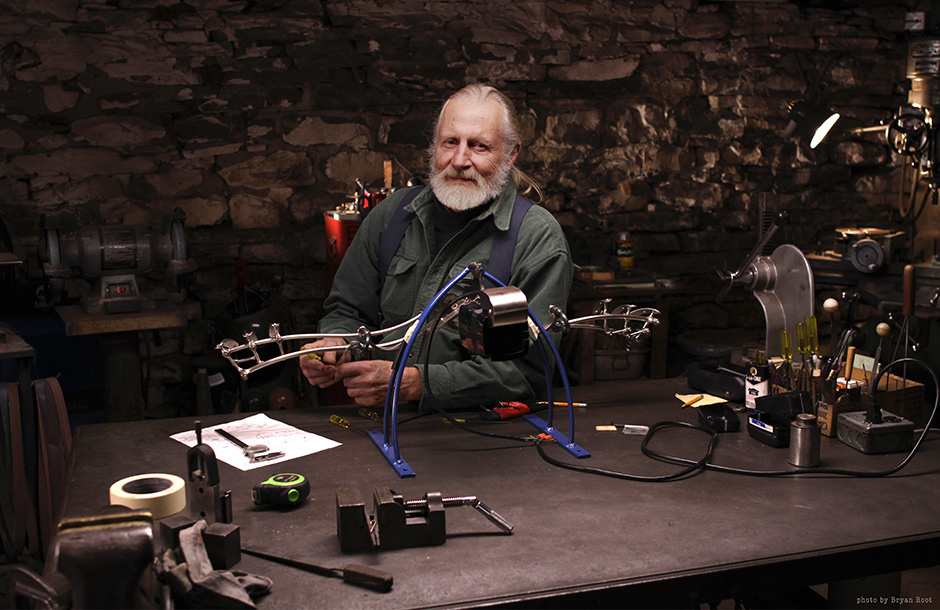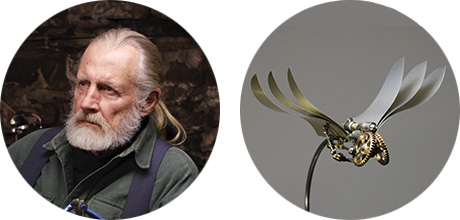
Bob Potts
In his one-man workshop housed in an 1850s barn, Potts creates ethereal kinetic sculptures capturing the very essence of natural rhythmical movements like the flight of birds or the oars of boats in his inimitable style. Born in 1941, the artist is a connoisseur of form, movement, and visual grace.

"My work is the manifestation of ideas that come to me from the natural world. The grace and form of all living things, and the way they interact, leaves me in awe."
The New York state-based artist manages to capture this reverence for nature by using a pallet of gears, cranks, sliders, levers and chain links to create kinetic sculptures. Potts invests substantial amounts of creativity and energy into his pieces. His sculptures can take up to a year to complete and each work of art is a unique piece.
Despite their apparent intricacy, the pieces are surprisingly minimalist. Potts uses the bare minimum to replicate each motion, without unnecessary ornamentation or flourish.
Capturing the very essence of natural rythmical movements
"In the movements of each piece, every part is necessary. In that respect, the form follows the function."
Method and process
“Sometimes I have an end in mind and look for the mechanism that will deliver what I desire.”
Potts creates beautiful pieces by using a variety of metals like stainless steel, aluminium, brass, bronze and copper. As a trained carpenter, he also works with wood. One of the most remarkable aspects of Potts’s work is his process. It is something that makes his sculptures feel "alive". He has developed an intuitive way of working that is not constrained by pre-conceived ideas.
“I am often challenged to use a specific mechanism and see where it goes. Sometimes I have an end in mind and look for the mechanism that will deliver what I desire.”
Despite the mechanical complexity of his work, the artist does not use computer-aided design software. Instead, Potts puts his carpentry skills to good use by making stick prototypes to help calculate all of the distances and dimensions, working out the geometry of the artwork he plans on creating. The design slowly reveals itself during this process and continually evolves. Most of the time, the final result is very different from what he envisioned in the beginning. To Potts, this is a good thing and gives him great satisfaction.
“It is very rewarding to see a piece grow and evolve. Is art not the reflection of the evolution of the artist ?”
Kinetic Sculptures
- Steel, brass, copper, aluminium, wood
- Unique piece (2015)
- 53'000 CHF inc. VAT
- Steel, brass, copper, aluminium, wood
- Unique piece (2014)
- SOLD
- Steel, brass, copper, aluminium, wood
- Unique piece (2013)
- SOLD
- Steel, brass, copper, aluminium, wood
- Unique piece (2012)
- SOLD
- Steel, brass, copper, aluminium, wood
- Unique piece (2009)
- SOLD
- Steel, brass, copper, aluminium, wood
- Unique piece (2001)
- SOLD
- Steel, brass, copper, wood
- Unique piece (1997)
- Potts family collection (not for sale)
- Steel, brass, copper, aluminium, wood
- Unique piece (2010)
- SOLD
Background
Potts was raised in San Francisco. He got his first taste of the art world by working for his brother and artist, Don Potts. They spent six years creating a tribute to American boyhood in the form of a mechanical sculpture called “My First Car”. "That is when I was introduced to the creative process in depth and my machine and welding capabilities grew,” says Potts. The sculptures toured the country’s top museums and exposed Potts to the art scene.
He then moved east and was a founding member of the Highwoods String Band, in which he played the fiddle. Mechanical tinkering soon re-established a hold on him. A Hot Rodder and motorcycle gear-head from an early age, he landed a job building a Corvette with rear-wheel steering.
The sculptures toured the country’s top museums and exposed Potts to the art scene.
It was around this time that Potts met painter and sculptor George Rhoads, with whom he built audio kinetic rolling ball sculptures for over 20 years. During this period Potts realised that he had to create his own work. Besides building sub-parts of larger sculptures for Rhoads, he also created smaller pieces for private collections. His chance to go it alone came when Rhoads introduced Potts to the Butler Institute in Ohio, which offered him a three-month solo exhibition. Potts’s "Pursuit II" sculpture won "Best in Show" at the "Made in NY 2011" juried show at the Schweinfurth Memorial Art Center.
Potts currently lives in Trumansburg, upstate New York.

